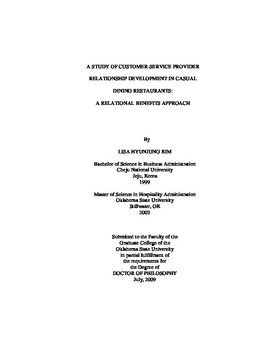| dc.contributor.advisor | Qu, Hailin | |
| dc.contributor.author | Kim, Lisa Hyunjung | |
| dc.date.accessioned | 2013-11-26T08:33:22Z | |
| dc.date.available | 2013-11-26T08:33:22Z | |
| dc.date.issued | 2009-07 | |
| dc.identifier.uri | https://hdl.handle.net/11244/7233 | |
| dc.description.abstract | Scope and Method of Study: The overall purpose of the study was to understand the more complete process of customer-service provider relationship development and maintenance in the context of casual dining restaurants. This study suggested that relational benefits (with four sub-dimensions, which is a more detailed view compared to the traditional view) be significant antecedents to increase consumer dependence on the relationship partner, which consequently influence consumer commitment and desired relational outcomes. The target population of the study was all the frequent travelers in the U.S. listed in a public available database purchased. A convenience sampling was utilized to draw samples. An online survey was conducted to collect data. Exploratory factor analysis, confirmatory factor analysis, structural equation modeling, and hierarchical regression analysis were used to analyze the data. | |
| dc.description.abstract | Findings and Conclusions: First, the study contributes to the identification of the new dimensionality of relational benefits and its differential effects on consumer dependence and relational outcomes. Especially, customization and confidence benefits are emphasized to increase consumer dependence, requiring more serious consideration from managers. Second, it provides more complete understanding about the nature of commitment as a mediator between consumer dependence and relational outcomes. The results imply that managers should pay attention to increasing consumer dependence as well as commitment to maximize the share of customers. Furthermore, managers need to allocate their resources to deliver excellent satisfaction and maximize the interdependence with customers to increase positive WOM communications from customers. Third, based on the theory of psychological reactance, the findings open the possibility that relational benefits can provide customers with intrinsic motivations to stay in the relationship without reactance to high switching costs. Lastly, the situational/conditional significance of a closeness of a relationship is proven to involve stronger attachment between a consumer and a service provider and the possibilities to deliver the relational outcomes that a firm desires. | |
| dc.format | application/pdf | |
| dc.language | en_US | |
| dc.rights | Copyright is held by the author who has granted the Oklahoma State University Library the non-exclusive right to share this material in its institutional repository. Contact Digital Library Services at lib-dls@okstate.edu or 405-744-9161 for the permission policy on the use, reproduction or distribution of this material. | |
| dc.title | Study of customer-service provider relationship development in casual dining restaurants: A relational benefits approach | |
| dc.contributor.committeeMember | Leong, Jerrold K. | |
| dc.contributor.committeeMember | Brown, Tom J. | |
| dc.contributor.committeeMember | Njite, David | |
| osu.filename | Kim_okstate_0664D_10479.pdf | |
| osu.accesstype | Open Access | |
| dc.type.genre | Dissertation | |
| dc.type.material | Text | |
| thesis.degree.discipline | Human Environmental Sciences | |
| thesis.degree.grantor | Oklahoma State University | |
